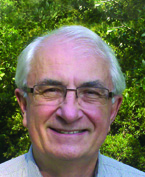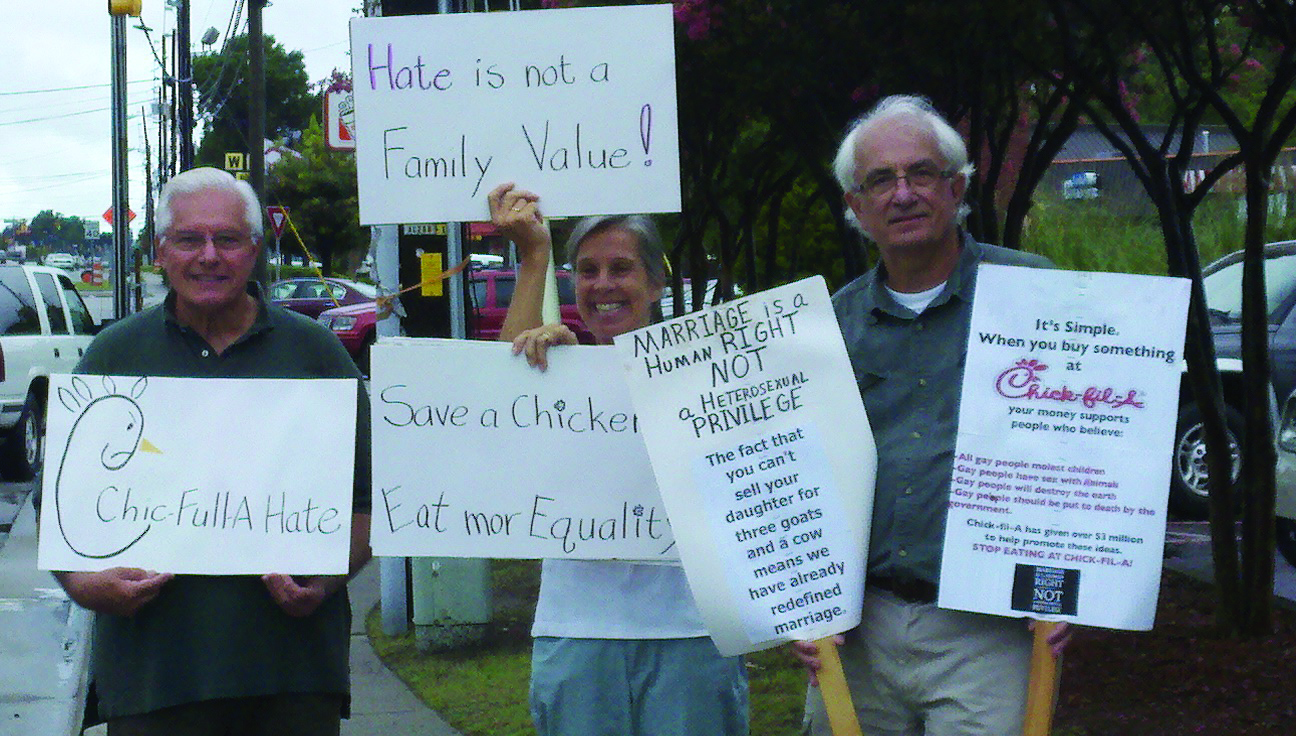Time to Turn Silence into Activism
 This past summer, after the owner of the fast-food franchise Chick-fil-A made headlines with a number of statements opposing marriage equality, about two dozen members of our humanist chapter protested outside a Chick-fil-A in Wilmington, North Carolina. The anger of the fundamentalists who attacked and demonized us as liberal, socialist, anti-free speech atheists ruining the country was nothing short of visceral hate. We represented a threat to their entire worldview, what the philosopher W.V.O. Quine calls a “web of belief” in which all of one’s values and beliefs hang together and when one thread is broken, the whole web threatens to fall apart. In this part of the country, support of same-sex marriage challenges the entire Southern identity, which includes the gun culture, belief in God, hatred of government, and “good ole boy” male patriarchy.
This past summer, after the owner of the fast-food franchise Chick-fil-A made headlines with a number of statements opposing marriage equality, about two dozen members of our humanist chapter protested outside a Chick-fil-A in Wilmington, North Carolina. The anger of the fundamentalists who attacked and demonized us as liberal, socialist, anti-free speech atheists ruining the country was nothing short of visceral hate. We represented a threat to their entire worldview, what the philosopher W.V.O. Quine calls a “web of belief” in which all of one’s values and beliefs hang together and when one thread is broken, the whole web threatens to fall apart. In this part of the country, support of same-sex marriage challenges the entire Southern identity, which includes the gun culture, belief in God, hatred of government, and “good ole boy” male patriarchy.
This is why changing minds on only one issue is so difficult in today’s highly polarized culture wars where everything folks hold dear—including relationships with family and friends—is on the line.
Religious scholar Martin E. Marty observed that fundamentalism arises not out of strength, but when the decline of a religion appears imminent, leading people to “double down” on their beliefs. The stridency we see today is a sign of fear, not of strength. In the United States the nonreligious now account for 19 percent of the population, per Pew Center survey figures put out in July, making us the fastest-growing demographic. The millennial generation in particular is becoming less religious here, following trends in Europe.
If the United States is indeed becoming a secular nation, we must concern ourselves with what kind of secular nation it will be. Considering the ideologies of nontheists like Joseph Stalin and Karl Rove, one can’t say the atheist model is necessarily a good one. Luckily, we have examples of societies to emulate, especially in countries in Northern Europe. These are humane and indeed humanistic societies where low participation in religion coincides with the lowest crime rates, the highest standard of living, the greatest self-reported level of happiness, the longest life span, the highest education, and the greatest upward mobility. (As one researcher said, if you want to live the American dream, go to Denmark.)
 The humanist lifestance is based on values, not beliefs, where open-minded critical thinking, science, justice, freedom, tolerance, democracy, compassion, human rights, inherent worth and dignity, and human flourishing hold our web of belief together. The authoritarian, otherworldly bent of the Abrahamic religions is incompatible with this worldview. But we can no longer afford the luxury of just critiquing religion. We must tell our alternate story so that those contemplating change know there is an alternate worldview that can support, inspire, and comfort them; that the knowledge of science, while tentative, is surely firmer than blind faith; that the exhilaration of focusing on the here and now is more meaningful than otherworldliness; that hope and love are certainly better than hate and divisiveness; andthat compassion and responsibility can be balanced with self-interest and freedom.
The humanist lifestance is based on values, not beliefs, where open-minded critical thinking, science, justice, freedom, tolerance, democracy, compassion, human rights, inherent worth and dignity, and human flourishing hold our web of belief together. The authoritarian, otherworldly bent of the Abrahamic religions is incompatible with this worldview. But we can no longer afford the luxury of just critiquing religion. We must tell our alternate story so that those contemplating change know there is an alternate worldview that can support, inspire, and comfort them; that the knowledge of science, while tentative, is surely firmer than blind faith; that the exhilaration of focusing on the here and now is more meaningful than otherworldliness; that hope and love are certainly better than hate and divisiveness; andthat compassion and responsibility can be balanced with self-interest and freedom.
Now is our time and now is our chance to move society toward reason and the good life. Now is our time to move society out of the dark ages of theocratic and ideological control toward human fulfillment. We cannot falter in the face of certain hostility, and we cannot stand idly by hoping for a secular society to automatically shape itself. It is our duty to show that a secular world need not end in nihilism, but can embrace a progressive humanist ethical worldview of human and global good.
